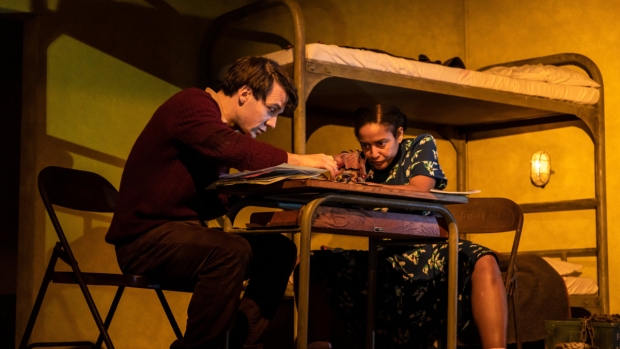After the End at Theatre Royal Stratford East – review

© The Other Richard
Two work colleagues, with an uneasy, ill-defined relationship, are trapped in a nuclear bunker after a nuclear explosion causes fallout in the city where they live. The premise of Denis Kelly's play is chilling – but not necessarily what you need in a week when a real-life missile strike caused a fire at a nuclear power station in Ukraine. Events depicted feel uncomfortably close to home.
Lyndsey Turner's revival of a play first seen in 2005 seems apposite in other ways too. It's an uncomfortable, disturbing and ultimately violent description of a toxic relationship and the ways men find of exerting power over women.
It quickly becomes clear that Mark (Nick Blood), her colleague at work, has an unhealthy obsession with Louise (Amaka Okafor). When they are entombed together, his illusions that she might feel the same about him – the nerd, the man who has been teased for buying a flat because it has a nuclear bunker in the garden – are initially comic, but rapidly become terrifying, as he starves her of food because she won't play "Dungeons and Dragons" with him, and thus fulfil one long-held fantasy. Things get worse, considerably worse, from there.
It's astonishing to think that five years after he wrote this Kelly produced the transforming musical Matilda. The view of human nature revealed here is so utterly bleak and depressed that it's hard to imagine it springs from the same brain.
In effect, that's what makes this early work so difficult. It's not just that the situation is terrifying or that the character traits displayed are so relentlessly unattractive; it's that they are very much one-note. Mark is creepy and controlling; Louise is confident and self-obsessed. You wouldn't much want to be in a nuclear bunker with either of them, and although both Blood and Okafor give well-defined performances, they are stuck with the same lack of texture.
That said, Turner's production is characteristically acute, mining some of the early comedy to make the later descent into horror all the more startling. Peter McKintosh contributes a stylised set – this is a very elegant bunker – in monochrome yellow, with the escape hatch (occasionally lit) high in the ceiling above them.
This not-quite-reality emphasises the thought that dawns on us and Louise simultaneously: we only have Mark's word that there has been a nuclear attack. We may be witnessing a very different narrative than the one originally presented. The queasy sense of growing terror is bolstered by Tim Lutkin's murky lighting, combined with blinding flashes of white light at the end of each scene, and by Tingying Dong's jangling score.
It's all terrifically done, and the sheer force of the writing – with a surprising twist towards the close – presages the quality of Kelly's career since. Maybe it's the timing of the production that just makes it feel heart-pressingly pointless. It is a production I admired, but not a play I ever want to experience again.












